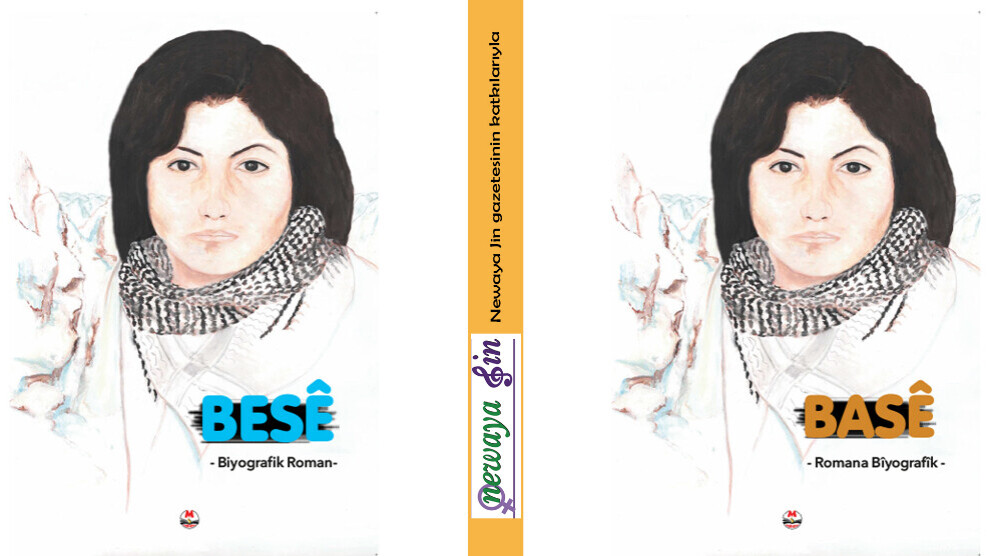Life of female PKK guerrilla Bese Anuş becomes a novel
The biographical novel was published in Turkish as "Besê" and in Kurdish as "Basê" and chronicles the life of Besê Anuş, one of the PKK's earliest guerillas and martyrs.
The biographical novel was published in Turkish as "Besê" and in Kurdish as "Basê" and chronicles the life of Besê Anuş, one of the PKK's earliest guerillas and martyrs.

Besê Anuş, one of the first female guerrilla martyrs of the Kurdish Freedom Movement, has had a biographical novel published about her life.
Written in the 2000s and prepared for publishing by the Newaya Jin newspaper, the book was published by Meyman Publishing House along with its Turkish and Kurdish translations.
Bese Anuş's life and struggle story in her biographical book is based on the testimonies.
Besê Anuş, a historical figure in the Kurdish liberation struggle, travelled from village to village before joining the guerrilla struggle, organizing local people to maintain their own identity, land, language, and belief.
A WITNESS OF THE MARAŞ MASSACRE AND VICTIM OF THE SEPTEMBER 12 COUP
Following the PKK's declaration, the colonial state launched a massive mass slaughter campaign in the region in December 1978. Besê's motivations for fighting grew stronger after witnessing the Maraş massacre.
During the September 12, 1980 coup d'état, Maraş was one of the most targeted regions. Besê was detained and subjected to severe torture.
One of her torturers admitted to Besê's stern attitude, who was placed on the torture table and was left without any parts of her body unwounded, saying, "I tortured her with my own hands. We couldn't get a word out of her. At the very least, we wanted to make her shout, but no matter what we tried, we couldn't get her to..."
THE WOMEN OF FIRSTS
Besê, enraged by the torture she endured and the brutality of the state in the region, joined a small guerrilla group in the countryside.
As a testament, she spoke the following words to her companions while sitting by the fire:
“If I am martyred, I believe that hundreds of women will raise their fists in support of me, and thousands of women will fight in Kurdistan's mountains."
Besê was the only one awake on March 17, 1981, as the first rays of dawn appeared on the horizon in Nurhak mountains.
Besê instantly woke up her friends after realizing they were encircled.
"...She was running out of breath, despite the wound on her foot, among the bullets that poured down on her. She couldn't go any further and left herself into Aksu River... She was caught between the bullets that rushed by like rain... Because all sides were surrounded, it was obvious that there was no way to escape safely by fighting. Besê got into the water, up to her knees. She pointed her Umman 14 weapon and fired it by walking over the glowing rifles closest to her, despite the hundreds of automatic rifles still being fired. And when the Aksu River reddened with the blood from Besê's wounded body and with blood running from her lips and nose, all the weapons went silent... By order of the colonial commander, Besê's wounded body, wrapped in a blanket, was taken to the plain on the lower slope of the Musolar village and held there for hours.”
The colonial commander's intimidation strategy failed, and a vast crowd carried Bese off on their shoulders.
AN IMPORTANT PERIOD IN THE HISTORY OF KURDISH WOMEN
Elif Ronahi, a member of the KCK Presidential Council and one of Besê Anuş's earliest companions, recalls us that Besê Anuş played an important role in dispelling the climate of terror produced by the state in the region and defending the victims facing genocide.
According to Elif Ronahi, publishing the biographical novel about Besê Anûş's life and struggle means bringing women together with an important moment in their own history.
Müslüm Güler, who participated in the novel's planning and composition and published her thoughts on it under the title "A few words," made the following notes about Besê:
"...Besê was one of those who, as a woman, dedicated her life in this last war to contribute to a humane solution by undertaking society's pain in her body and conscience. Besê's struggle is especially significant since it coincided with the early years of the conflict's intensification, and she was the first of the women to die in this war."